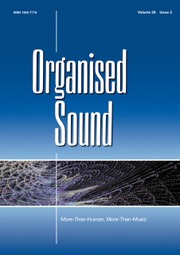Article contents
Timbral praxis: when a tree falls in the forest is it music?
Published online by Cambridge University Press: 05 April 2007
Abstract
There is growing evidence of widespread acceptance of timbre as a primary surface feature and as a structural device in music across genres. This is a result of a growing body of source material available in musical contexts through recording and sampling. Composers using new sounds are creating new musical syntax and structures, and consequently, new contexts and paradoxical or ‘synchretic’ situations that motivate resolution by the listener. New source materials, syntax, structure and synchresis pose challenges for the analyst in this largely non-notated music as well. Research in perception and the formation of conceptual frameworks is providing key information towards understanding this growing timbral common practice and how to talk about it with cogency and depth.
- Type
- Research Article
- Information
- Copyright
- Copyright © Cambridge University Press 2007
- 4
- Cited by


